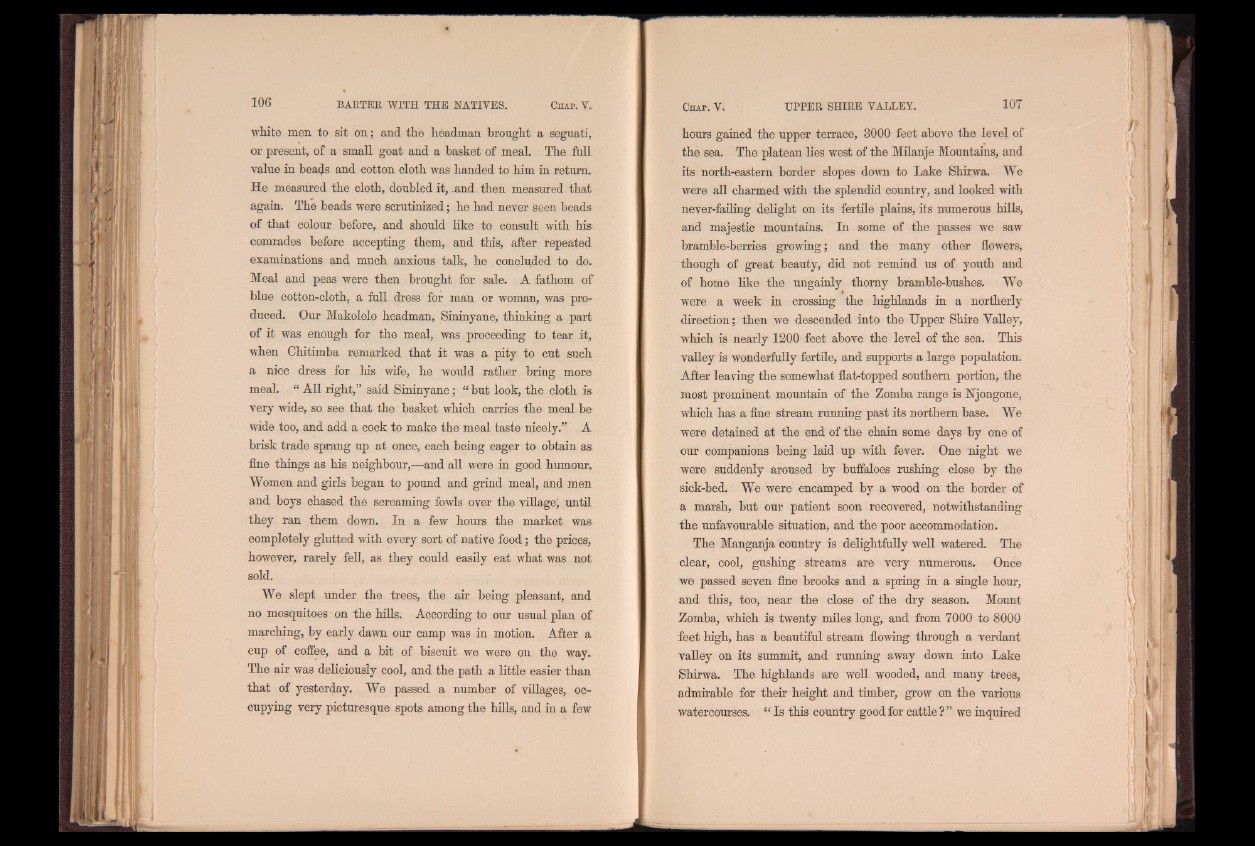
white men to sit on; and the headman brought a seguati,
or present, of a small goat and a basket of meal. The full
value in beads and cotton cloth was handed to him in return.
He measured the cloth, doubled it, .and then measured that
again. The beads were scrutinized; he had never seen beads
of that colour before, and should like to consult with his
comrades before accepting them, and this, after repeated
examinations and much anxious talk, he concluded to do.
Meal and peas were then brought for sale. A fathom of
blue cotton-cloth, a full dress for man or woman, was produced.
Our Makololo headman, Sininyane, thinking a part
of it was enough for the meal, was proceeding to tear it,
when Chitimba remarked that it was a pity to cut such
a nice dress for his wife, he would rather bring more
meal. “ All right,” said Sininyane; “ but look, the cloth is
very wide, so see that the basket which carries the meal be
wide too, and add a cock to make the meal taste nicely.” A
brisk trade sprang up at once, each being eager to obtain as
fine things as his neighbour,—and all were in good humour.
Women and girls began to pound and grind meal, and men
and boys chased the screaming fowls over the village, until
they ran them down. In a few hours the market was
completely glutted with every sort of native food; the prices,
however, rarely fell, as they could easily eat what was not
sold.
We slept under the trees, the air being pleasant, and
no mosquitoes on the hills. According to our usual plan of
marching, by early dawn our camp was in motion. After a
cup of coffee, and a bit of biscuit we were on the way.
The air was deliciously cool, and the path a little easier than
that of yesterday. We passed a number of villages, occupying
very picturesque spots among the hills, and in a few
hours gained the upper terrace, 3000 feet above the level of
the sea. The plateau lies west of the Milanje Mountains, and
its north-eastern border slopes down to Lake Shirwa. We
were all charmed with the splendid country, and looked with
never-failing delight on its fertile plains, its numerous hills,
and majestic mountains. In some of the passes we saw
bramble-berries growing; and the many other flowers,
though of great beauty, did not remind us of. youth and
of home like the ungainly thorny bramble-bushes. We
•
were a week in crossing the highlands in a northerly
direction; then we descended into the Upper Shire Valley,
which is nearly 1200 feet above the level of the sea. This
valley is wonderfully fertile, and supports a large population.
After leaving the somewhat flat-topped southern portion, the
most prominent mountain of the Zomba range is Njongone,
which has a fine stream running past its northern base. We
were detained at the end of the chain some days by one of
our companions being laid up with fever. One night we
were suddenly aroused by buffaloes rushing close by the
sick-bed. We were encamped by a wood on the border of
a marsh, but our patient soon recovered, notwithstanding
the unfavourable situation, and the poor accommodation.
The Manganja country is delightfully well watered. The
clear, cool, gushing streams are very numerous. Once
we passed seven fine brooks and a spring in a single hour,
and this, too, near the close of the dry season. Mount
Zomba, which is twenty miles long, and from 7000 to 8000
feet high, has a beautiful stream flowing through a verdant
valley on its summit, and running away down into Lake
Shirwa. The highlands are well wooded, and many trees,
admirable for their height and timber, grow on the various
watercourses. “ Is this country good for cattle ? ” we inquired